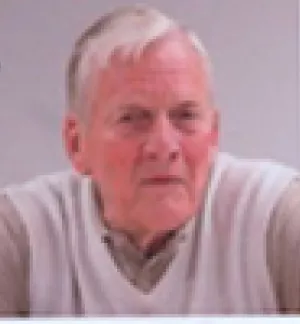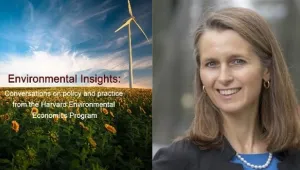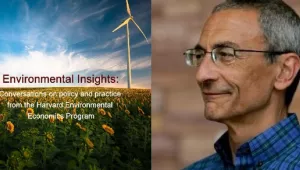In the Fall of 1998, Harvard University''s John F. Kennedy School of Government offered a graduate-level course, Using History to Inform Policy: Lessons from the Massachusetts Forest. The instructors were Charles H.W. Foster, adjunct research fellow and lecturer, and fomer Massachusetts state forester, secretary of environmental affairs, and dean of the Yale University School of Forestry and Environmental Studies; and David R. Foster, Director of the Harvard Forest.
The course was taken by fifteen students. Nineteen outside expert lecturers were invited to share their views and experiences with the class. A special colloquium of national forest history experts was convened to provide added perspective on the relationship between history and policy.
The course was inspired by the recently published Massachusetts forest history, Stepping Back to Look Forward (Charles H.W. Foster editor, Harvard Forest/Harvard University Press, 1998), which chronicles more than three centuries of forest use in the Commonwealth of Massachusetts. Students were asked to identify the principal lessons from that experience and to derive policies and actions that would make the current cycle of growth and utilization one of intent and design, not simply an accident of history. In so doing, it was hoped that these future public and private managers would learn how history can and should be used to inform policy.
The first third of the course constituted an introduction to the principles and practices of forestry, culminating in a day-long field trip to the Harvard Forest and metropolitan Boston''s Quabbin water supply watershed in north central Massachusetts. During the second unit, students systematically examined the historical record pertaining to ecology and land use, economic uses, state forestry programs, private and community forestry, and the national and cultural context for Massachusetts forests and forestry. During the final unit, students posed questions on possible initiatives to invited nongovernmental, governmental and legislative policy leaders. From a series of substantive and implementation memos developed by student teams and a set of individual papers, the findings and recommendations of this policy paper have been derived. Its title underscores several themes we feel need to be kept in mind.
The importance of "thinking in forest time" echoes a thesis first set forth by Harvard faculty members Richard E. Neustadt and Ernest R. May, whose own Thinking in Time: The Uses of History for Decisionmakers (The Free Press, 1986) have guided national security experts and inspired generations of Kennedy School students in their preparation for public policy careers. We are grateful to Professor May for encouraging us to apply this concept to environmental and natural resources issues. In brief, the concept asserts that problems occur simply as elements in a continuous time stream -- the process by which the present moves to become part of the past. Thus, problem-solving in the absence of an historical context can lead to inadequate or even flawed solutions. In the case of forests, this concept is particularly appropriate as historical events, processes, or decisions may control future conditions for many centuries, at the very least.
But "thinking in forest time" also identifies a principal problem in forestry today. In Massachusetts, forests grow and mature over periods of 80 to 100 years, whereas forest owners change about once every seven years. Thus, to grow a forest to full maturity requires a dozen or more owners, each committed to completing the full biological and economic cycle -- under normal circumstances, an unrealistic expectation. For these reasons, the typical Massachusetts forest will likely be harvested just as soon as it achieves any economic value, thereby depriving the Commonwealth of the full range of goods, services, and values this remarkable resource is capable of delivering.
The second part of the title is our answer to this problem -- the need for a thoughtful strategy, illuminated by history, to apply reason and intent to the natural process of forest growth and development. In a state like Massachusetts where forests are predominantly privately-owned, and where the tradition of individual freedom is still fiercely defended, the idea of foresight and intervention may prove anathema to some. But, as the lens of history informs us, for at least the last few centuries of forest growth and utilization, the laissez fair approach has determined the management, use, and ultimate condition of the Massachusetts forest. For our currrent forest, we are convinced that we can and should do better.
Charles H.W. Foster
David R. Foster
Foster, Charles. “Thinking in Forest Time: A Strategy for the Massachusetts Forest.” Harvard Kennedy School, October 1, 1999





